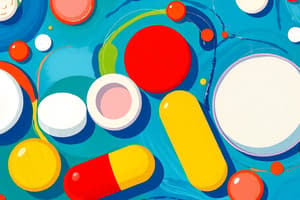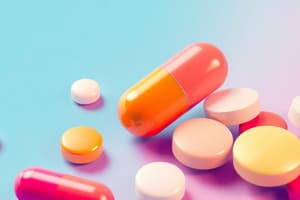Podcast
Questions and Answers
What is the primary purpose of buccal tablets?
What is the primary purpose of buccal tablets?
- To dissolve completely before swallowing
- To achieve rapid systemic circulation
- To provide local effects on mouth ulcers (correct)
- To replace traditional oral medications
Which mechanism allows sublingual tablets to achieve rapid effects?
Which mechanism allows sublingual tablets to achieve rapid effects?
- Controlled dissolution rate
- Extended release formulation
- First pass metabolism
- Absorption through the oral mucosa (correct)
What is NOT a major limitation of conventional oral formulations?
What is NOT a major limitation of conventional oral formulations?
- High oral doses required
- Controlled release delivery (correct)
- Variation in oral absorption
- Inconvenience of short plasma half-lives
What is an ideal characteristic of a drug for oral controlled release (OCR) formulation?
What is an ideal characteristic of a drug for oral controlled release (OCR) formulation?
Which strategy is NOT commonly used in the formulation of controlled release drugs?
Which strategy is NOT commonly used in the formulation of controlled release drugs?
What does improving bioavailability in drug formulation aim to achieve?
What does improving bioavailability in drug formulation aim to achieve?
What distinguishes sustained release from delayed release drug formulations?
What distinguishes sustained release from delayed release drug formulations?
Which factor is essential for controlling the release rate of a drug?
Which factor is essential for controlling the release rate of a drug?
What is one significant reason for formulating drugs into solid dosage forms?
What is one significant reason for formulating drugs into solid dosage forms?
What is a primary advantage of solid dosage forms compared to liquid formulations?
What is a primary advantage of solid dosage forms compared to liquid formulations?
Which patient population may have difficulties with solid dosage forms?
Which patient population may have difficulties with solid dosage forms?
What is the benefit of enteric-coated tablets?
What is the benefit of enteric-coated tablets?
What process is used to create capsules, including hydrogel and softgel capsules?
What process is used to create capsules, including hydrogel and softgel capsules?
What is a common limitation of solid dosage forms?
What is a common limitation of solid dosage forms?
Which formulation type can provide site-specific drug delivery?
Which formulation type can provide site-specific drug delivery?
What characteristic of solid dosage forms contributes to their longer shelf life?
What characteristic of solid dosage forms contributes to their longer shelf life?
What is the primary advantage of using soft gelatin capsules (SGCs) for drug formulation?
What is the primary advantage of using soft gelatin capsules (SGCs) for drug formulation?
Which component is added to gelatin in SGCs to plasticize the material?
Which component is added to gelatin in SGCs to plasticize the material?
What purpose do the tampered tips and ridges of coni-snap caps serve?
What purpose do the tampered tips and ridges of coni-snap caps serve?
What is the typical residual moisture content in soft gelatin capsules?
What is the typical residual moisture content in soft gelatin capsules?
Which of the following is NOT a feature of soft gelatin capsules?
Which of the following is NOT a feature of soft gelatin capsules?
What is a significant limitation of solid dosage forms?
What is a significant limitation of solid dosage forms?
What characteristic of SGCs contributes to their ease of swallowing?
What characteristic of SGCs contributes to their ease of swallowing?
Which factor is NOT influential in dosage form design?
Which factor is NOT influential in dosage form design?
What distinguishes soft gelatin capsules (SGCs) from hard gelatin capsules (HGCs)?
What distinguishes soft gelatin capsules (SGCs) from hard gelatin capsules (HGCs)?
The content uniformity of soft gelatin capsules typically ranges within what percentage?
The content uniformity of soft gelatin capsules typically ranges within what percentage?
Which of the following ingredients is NOT typically found in the formulation of soft gelatin capsules?
Which of the following ingredients is NOT typically found in the formulation of soft gelatin capsules?
What is the range of desirable bloom strengths for gelatins used in capsules?
What is the range of desirable bloom strengths for gelatins used in capsules?
Which property of gelatin is an empirical measure of gel strength?
Which property of gelatin is an empirical measure of gel strength?
What is the primary component commonly used in producing hard gelatin capsules?
What is the primary component commonly used in producing hard gelatin capsules?
Which of the following is NOT an advantage of hard gelatin capsules (HGCs)?
Which of the following is NOT an advantage of hard gelatin capsules (HGCs)?
What characteristic makes gelatin ideal for use in capsules?
What characteristic makes gelatin ideal for use in capsules?
What does diffusion control in drug formulations primarily refer to?
What does diffusion control in drug formulations primarily refer to?
What is the primary role of the semi-permeable membrane in OROS drug delivery systems?
What is the primary role of the semi-permeable membrane in OROS drug delivery systems?
Which factor does NOT affect the diffusional flux according to the content?
Which factor does NOT affect the diffusional flux according to the content?
What is meant by matrix disintegration in the context of drug formulations?
What is meant by matrix disintegration in the context of drug formulations?
In a diffusion-controlled delivery system, the term tortuosity refers to what?
In a diffusion-controlled delivery system, the term tortuosity refers to what?
Which of the following physical strategies is NOT used for solid oral formulations?
Which of the following physical strategies is NOT used for solid oral formulations?
What is the effect of osmotic pressure in drug formulations like OROS?
What is the effect of osmotic pressure in drug formulations like OROS?
Flashcards are hidden until you start studying
Study Notes
Why Pharmaceutical Dosage Forms?
- Safe and convenient delivery of accurate dosing
- Project drug substance from atmospheric oxygen or humidity
- Protect drug substance from gastric acid after oral administration
- Conceal bitter, salty or offensive taste or odor of a drug substance
- Provide liquid preparations of an insoluble or unstable drug
- Provide rate-controlled drug action
- Provide site-specific drug delivery
Advantages of Solid Dosage Forms
- Convenient to carry, readily identified and easily taken
- Longer shelf life before expiring
- Efficiently produced
- Easier to package, distribute, ship, and store
- The dosing is more accurate, comparing to liquid formulation
- Possibility of controlled drug delivery
Disadvantages of Solid Dosage Forms
- Certain patients population may have difficulty swallowing large tablets or capsules
- Solid dosage forms are not appropriate for patients who are unconscious or intubated
- Solid dosage forms take longer to break down, dissolve, absorb, and distribute in the body
- Therefore, solid dosage form may not fit for emergency intervention
- Some drugs (esp. biologics) are not suitable in a solid dosage form
Influential Factors in Dosage Form Design
- Molecular Size and Volume
- Drug solubility and pH
- Partition Coefficient
- Polymorphisms
- Stability
- pKa/Dissociation Constant
- Particle size and dissolution rate
- Membrane permeability
Capsules
- Solid dosage forms in which the drug is enclosed within either a hard or a soft soluble container or ‘shell’
- Filled capsules are generally swallowed whole, sometimes caregivers may open the capsule and mix the drug with food/drink
Hard Gelatin Capsules (HGC)
- Elegant
- Easy to use, convenient
- Smooth, slippery, easily swallowed
- Tasteless
- Economical
- Better bioavailability
- Diverse formulations i.e., beads, granules, microtablets, semisolids
Properties of Gelatin
- Molecular weight ~20-200 kDa
- Usually mixtures of Type A and B are used
- Bone gelatin contributes firmness but is hazy
- Pork skin gelatin contributes plasticity and clarity
- Two main physicochemical properties:
- Bloom strength: empirical measure of gel strength, measured in Bloom gelometer, weight in grams required to depress a standard plunger into the surface of 6.67% w/w gel, desirable bloom strengths: 150-280 g
- Viscosity
Industrial Manufacture
- Sealing and banding: prevents separation, tamperproof (not safety proof)
- Self-locking caps: Snap-Fit, Coni-snap, coni-snap supra (Capsugel), Loxit (Pharmaphil)
Soft Gelatin Capsules (SGC)
- A one-piece, hermetically-sealed formulation containing medication in a liquid or semi-liquid state that has been formed, filled, and sealed in one operation.
Advantages of SGCs
- Elegant
- Easy to use, portable, convenient
- Smooth, slippery, easily swallowed
- Taste masking
- Requires the drug to be liquid, or at least dissolved, solubilized, or suspended in a liquid vehicle (e.g., clofibrate®, reduces serum triglycerides; is ethyl ester prodrug of clofibric acid, replaced by fenofibrate) or drugs in a liquid vehicle (e.g., digoxin, Lanoxicaps®).
- Metered liquid fill very accurate
- Homogeneous – content uniformity of ± 3% reported
- Local effect: mesalamine
Buccal & Sublingual Tablets
- Bypass the first pass metabolism
Buccal Tablets
- Intended to dissolve in buccal cavity (or gums)
- Usually designed to dissolve slowly
- Prolonged effects – contains bioadhesive to adhere to inside of mouth
- Duration of effect: 15-45 mins to 6-8 hours
- Fentanyl citrate (Actiq) intrabuccal/transmucosal lozenge
- Ideal for drugs that can be destroyed or poorly absorbed in GI
- Local effects – mouth ulcers (directly on affected area)
- Lozenges (troches)
Sublingual Tablets
- Placed under the tongue
- Allow to dissolved
- Rapid effect
- Avoids first pass effect
- Examples: glyceryl trinitrate (rapid effect), testosterone (poor GI availability – no longer in US)
Controlled Release Dosages
- Control rate of drug delivery (release)
- Control onset, duration, and intensity of effect
- Control site of absorption
- Reduce total dose required
- Improve bioavailability
- Improve safety (particularly of drugs with low TI)
- Improve efficacy of drugs with short plasma half-lives
- Improve compliance
Terminology
- Controlled delivery
- Sustained delivery
- Prolonged delivery
- Delayed delivery
- Pulsed delivery, repeat action
- Localized delivery
- Site-specific delivery, targeted delivery
IDEAL DRUG FOR OCR FORMULATION
- A low molecular weight, freely water-soluble drug that is well and/or predictably absorbed and metabolized after oral administration, with a low plasma half-life (< 8 h) and high therapeutic index (> 10).
Formulation Strategies for CR formulations
- PHYSICAL (most common). Controlled dissolution, diffusion, disintegration (erosion), pH effects, osmosis, density.
- CHEMICAL - prodrugs.
- BIOLOGICAL e.g., antibodies
- MECHANICAL e.g., pumps
- PHARMACOLOGICAL.e.g.Probenecid-penicillin
PHYSICAL STRATEGIES
- Diffusion control
- Dissolution control
- Erosion (disintegration)
- Osmotic control
- pH dependent
- Ion-exchange
- Density control (low and high)
- Partition control (NOT for solid oral formulations)
Diffusion-based formulation
- Diffusion through semi-permeable membrane (film coating). Reservoir system
- Diffusion through nondisintegrating matrix (tablet but also semi-solid ointment or viscous liquid)
Diffusion Controlled Delivery
- Diffusion is the mass transfer of drug molecules by random motion from a region of high concentration to lower concentration. 𝑀
- The diffusional flux is proportional to the concentration gradient, dC/dx. 𝑑𝐶
Diffusion Controlled Delivery
- Diffusion through insoluble, non-disintegrating matrix
- If matrix disintegrates, drug release rate depends on rate of disintegration, dissolution, or both.
- Matrix
OROS
- Drug reservoir- conventional tablet
- coating - semipermeable
- Principle of operation: water flows into tablet due to osmotic pressure, at a rate controlled by permeability of membrane. Water dissolves drug, increases hydrostatic pressure inside tablet. Drug in solution forced to leave via orifice.
Studying That Suits You
Use AI to generate personalized quizzes and flashcards to suit your learning preferences.




